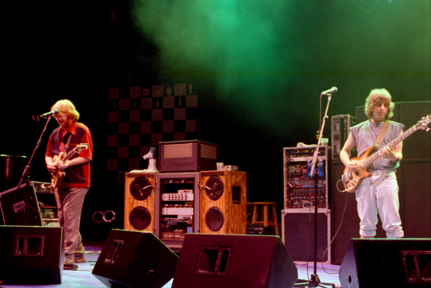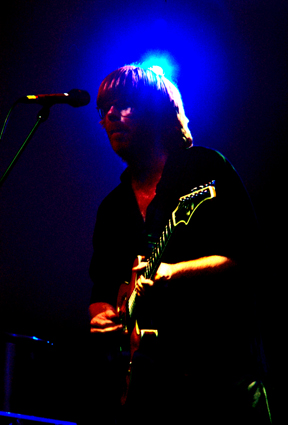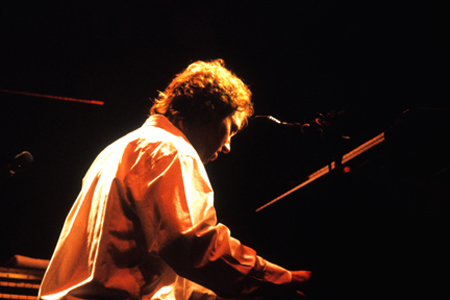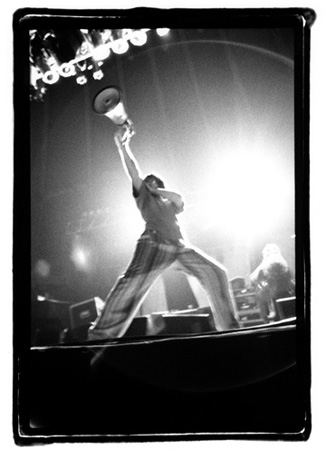THE THREE DECEMBERS - 1995 (PART I)
The following is a series of essays tracking Phish’s improvisational development across three important & symbolic months in their history: December’s 1995, 1997 and 1999. The goal here is to showcase how the band, thirteen years into their career, peaked, and then rediscovered their sound and artistic inspiration over a four year period that saw them grow in greater popularity while fighting off personal demons. It’s this writer’s hope that this series helps to showcase the development of the band, their insatiable pursuit of musical connection, and the ultimate toll this took on the members of Phish.

I. Introduction
Just for a minute step back and consider the multitude of events that had to go right to create a scenario for a month like December 1995 to occur for Phish, or for any band for that matter.
First and foremost, Phish had to form, which means its four members - all from a variety of parts of the overpopulated Northeastern United States - had to meet each other, and see enough potential in their relationships to spend the time playing music together. Then they had to want to continue playing music together. Not want in the way of casually enjoying hanging out with someone, but fully believing that their other three counterparts were talented enough, passionate enough and driven enough to continue working - keyword: working - toward some obscure, intangible, somewhat undefinable goal. No matter what direction they would decide to take their music, they had to keep working at it to move forward. Working at it when all looked hopeless and they had graduated from college - burdened with the added pressures of adulthood and careers, mortgages and marriage, blah blah blah - and were still overjoyed when just 2000 people came out to see them play. One Time.
Working at it when their hard work began to pay off, when they began to make money, and began to develop some sense of a national following, rather than allow the success to get to their heads. Working at it even when they surpassed probably their own wildest imaginations of what they could actually be, in April 1992, in August 1993 and again in June and November 1994.
Working at it day-in-and-day-out in the way an elite basketball team works on defensive schemes long after practice was scheduled to end. Working at a craft in a focused and driven manner all in the name of creating the music that played in their heads in a live, improvisational setting.

What's more is that the decisions they made along the way, in the years and months leading up to December 1995, had to match both their practical needs as a band, and push them further along the path they'd traversed. Decisions such as Trey's acceptance of Page into Phish in 1985, when, after stating that Phish was a "two-guitar band," he realized that Page's keys offered a different dynamic to his melodies, and would provide him with a partner to create multi-layered textures, intertwined conversation pieces, and rousing, anthemic jams over the foundational rhythms produced by Mike and Fish.
Trey's decision to halt his devotion to - and covering of - The Grateful Dead in 1986, a move that forced Phish to focus more on crafting their own sound.
Further decisions such as, their five performances of their mini-opus, Gamehendge in 1988, 1991, 1993 and 1994 (twice), along with their never-ending gags centered around songs that Fishman despised, and their insistence on including their fans as much as possible in their New Years and Halloween extravaganzas, all of which created a sense of unity, brotherhood, and an unbreakable bond between them and their fans.
Musically, they consciously pushed away from their expansive sounds and jams of 1987 and 1988, and gave way to a more refined approach from 1989 through 1992, wherein which they wrote three albums worth of music - and then some - and focused on tightening their live sound. Demanding perfect communication, skillful agility, airtight segues, relentless energy, a heaping dose of tongue-in-cheek humor, and stop-on-a-dime precision, Phish transformed their sound to that of a well-oiled machine, crafting shows full of musical peaks, professional acumen and nonsensical gags.
By Spring 1992 one was more than guaranteed to be blown away walking out of a Phish show. A far more engaging experience than the lonerism spirit of the grunge scene, far less expensive and far more technically impressive than the big name rock and pop groups that catered to the masses, Phish wore their irrelevance and isolation at the time like a badge of honor. And by the winter of 1993, their dedication paid off in full, as can be heard most notably in their February 20th show at the Roxy Theatre in Atlanta, GA. Taking a leap forward in the confines of a single show in a way they hadn't ever before, Phish fused the tight and explosive sound they'd crafted over the previous four years with the exploratory origins they'd been founded in. Wielding a set of segues, teases and jams in and out of "Tweezer" and "Mike's Groove," a porthole opened. Phish would never be the same.
From there the band would only continue to build upon their sound in an obsessive search to craft music that displayed them not as four individuals playing music together, but as a unified force playing as one. It is this goal which could only be realized after shedding their improvisation roots in 1989 and building themselves back up as a tight and edgy rock band, but wouldn't be actualized in part until December 1995, and then in full in 1997 thanks to the Talking Heads’ Remain In Light.
August 1993 gave the band their first headlining summer tour of the nation's concrete, open air amphitheaters which, in turn, gave them the space to stretch their music in ways they hadn't before. Moreover, their fanbase had more or less been solidified by now, allowing them the comfort and confidence that they'd have a passionate and loyal crowd awaiting their every show.
From here they sought out more fans, infusing their shows with an array of popular covers, exploring the endless musical diversions their songs could traverse, and including everyone in the poignant and intriguing myths they'd crafted in their college years - from Col. Forbin climbing up the mountain to save Gamehendge, to Poster Nutbag and Jimmy's unending battles against Harpua. Their shows were transformed from simply high-energy workouts to events that meant something, where anything-could-and-would-go.
It’s at this point that fans could begin communicating in code of single dates. Within their core group, simply stating 5/8/93, 8/14/93 or 8/20/93, for example, signified an understanding amongst anyone in the know. Even more, a single song that had been played with a similar enthusiasm for five years, say, "Bathtub Gin," became, on nights like August 13th 1993, an unending journey into the unknown, opening up vast cavernous vaults of potential for exploration and mind-bending music.

And yet, they still kept growing. From the wide-eyed musical successes of 1993 came the renaissance of 1994.
After taking the Fall and Winter of 1993 off - spare the historic NYE run that also served as a veritable THANK YOU!!! to the entire Northeast - to record Hoist, they booked themselves 123 shows, crisscrossing the country not once, not twice, but three separate times in effort to spread their collective energy. They planned a Halloween show in which they would don a musical costume, crafted the blueprint for their eventual multi-show festivals, built upon the exploratory journeys unleashed the previous summer, played their first of 60 shows in the world's most famous arena, and ultimately compiled a year that would be considered far and away the best of literally any other band's career.
One of the most important decisions the band made in 1994 was not a musical or stylistic one, instead it was a logistical decision that would help to alter the course of their music and career forever. In the previous ten years of their existence, they'd always used Fall Tour as a homecoming of sorts. After spending the majority of the year on the road spreading their sound, their tours would always wrap back to the confines of the Northeast - the 1992 Fall Tour is the lone black sheep in this category: it concluded in Montreal, not exactly their home turf, but still, close enough to the Vermont border - for a supercharged homecoming celebration of sorts.
However, in 1994, following their monumental Halloween show in Glens Falls, NY Phish began a journey westward that would conclude over a month later in Santa Monica, CA, and wouldn't bring them back for a show on the east coast until December 28th. The decision was reminiscent of their college-era practice sessions where they would lock themselves in a room for hours, jamming non-stop, in effort to understand the musical tendencies of each other and the patterns they could create. By separating themselves from their home base, and traversing into the wide, expansive West, they released themselves from all expectations, and dove headfirst into a musical experiment they'd been training for since 1989.
Using the open-ended structures written into some of their best known songs - most notably, "David Bowie" and "Tweezer" - they allowed themselves to be taken over by the possibilities that lay within numerous portholes of their songs. A decision made, consciously or not, when they wrote their earliest classics, pockets of space were left open within their complex structures that years later - after the band had reached a point of mastery within their songs - were suddenly thrust open and used to dive deeper into the unknown than they may have ever thought possible. The tour was a revelation into how far they could take their music, how lost they could get within the medium of a live concert, how far away they could get from themselves, their own personal wants and needs, and their own self consciousness, all in the name of musical and non-verbal communication.
When they returned to the stage in June of 1995, Phish built upon this exploratory revolution to their sound, infusing the entire tour with an array of jams that stretched out further and wider, into deeper and darker realms than they ever had before, all in the name of a linear musical communication. Many second sets were engulfed in this singular goal. Nearly every show contains a massive 25+ minute foray into the unknown, and, for perhaps the first time ever, Phish played without a sense of care of anyone watching them.
Most likely turning away a number of fans, the band believed that the decision to take such extreme risks each night would pay off in the future. Putting everything on the line every single night, Phish bared their souls to their audience in ways they never had before. No longer locked in a room together, no longer in search of musical perfection, no longer worried about sustaining themselves financially through their creativity, no longer worried about building a national following, Phish was completely free to use their shows as an opportunity to dive head first into the unknown….fuck the consequences.
In the end, the tour is one of the most divisive and controversial in their history. Some fans cannot stand the sound of the band 30-odd minutes into a "Tweezer". Some can't grasp the fact that their second sets started featuring less songs than fingers on a hand. Some fans wither in terror at the self-indulgent experiments, much of which produced music that many consider to be unlistenable. Yet others view it with reverence. It’s the one moment where Phish was clearly at the top of their game in terms of musical chops, and blended it with a divine and twisted hurdle into the unknown.

Whatever way you look at it, the decision to continue and expand upon the explorations of 1994 had a profound impact on the trajectory of the band. This was Phish deconstructing themselves once again in front of our eyes.
Yet, where 1989's house cleaning was conducted in effort to sharpen their catalogue and inject a massive supplement of energy into their shows, the purpose of June 1995 was to move past the music they'd written, and try to simply understand music from a basic communicative level. The goal in all of this was the aforementioned search for a style and a sound that allowed Phish to play as a unified instrument of linear communication.
Tragically, the death of one of Phish's greatest influences, and one of the most significant figures in the music they'd dedicated more than ten years to - Jerry Garcia - did more to bring Phish into the mainstream than anything they'd done themselves throughout their career.
Suddenly there was a surge of fans who'd never cared much about Phish's punky, aggressive and ironic approach to music that jumped on tour in search of the next party bus. With this onslaught came a need for larger venues, and their shows began to take on a larger than life feel.
The Fall Tour that followed essentially featured two Phish's. The first, in their October journey from California to Chicago, found them toning down the experimental diversions of the summer in favor of a sound that blended of the torrential energy of their 1989 - Summer '94 shows, with a dash of the psychedelia that overtook Summer 1995. Here, they became a band in search of something once again, reaching it inconsistently, yet ultimately hinting at the brilliance that was just around the corner. In many of the same ways that Fall 1996 would hint at the organic cow funk that would fully bloom in 1997, October 1995 gave us glimpses of how powerful Phish would be once they got rolling.
A ten-day break following their explosive Halloween show, in which they flawlessly played The Who's Quadrophenia, was a key move to rest and prepare for the two month trek ahead of them.
Whereas Fall 1994 was a journey of westward expansion, Fall 1995 was a mad dash from Atlanta to Lake Placid. Five weeks, 15 States, 29 shows, all concluding with a 13 show run through their New England homebase.
It was the culmination of 13 years of practice, travel, more practice, unending energy, drive, commitment, friendship, trials, heartaches, weddings, shows in front of no one, more hungover drives across two states in one day than anyone wanted to remember, more practice, shitty food, a singular belief that what you were doing was right, loans, more practice…... all leading up to a month in which the band played the best music they've ever played at the highest level they'd been at to that point, in front of the people who'd been there from the start: their friends, family and fans who'd given everything to hear the intoxicating, uplifting and uncompromising music of Phish.
----------------
Step back for a moment and think about what it took to get to this point. Consider the four irreverent 19 year-olds who connected in a counterculture, liberal incubator with an idea: to break apart the norms of popular music & craft singular concerts that felt like more than just a collection of songs. Consider the likelihood of anyone offering them a gig in the mid-1980’s, let alone these four guys, who fit into zero molds of pop culture in 1995, headlining arenas just 13 years later.
(Come Back on Thursday For Part II of The Three Decembers - 1995)
Brian Brinkman is the Co-host of the Beyond The Pond Podcast (@_beyondthepond) and can be found on Twitter at @sufferingjuke
Comments
You must be logged in to post a comment.

 The Mockingbird Foundation
The Mockingbird Foundation
Oy vey.
Oh yay!